REWARD Hr 1-888-404-FWCC Call Toll-Free 24
advertisement
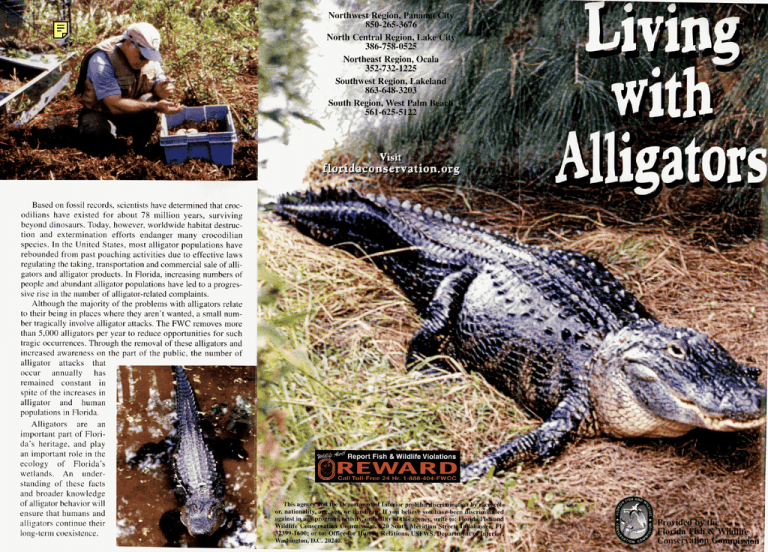
REWARD Call Toll-Free 24 Hr 1-888-404-FWCC Living with Alligators Alligators and humans have shared marshes, swamps, rivers and lakes of the southeastern United States for many centuries. American Indians and early European pioneers occasionally used this reptile for food, hut not until fashion markets began producing alligator skin products did this prehistoric reptile become heavily hunted. A century of unrestricted and unregulated hunting depleted most accessible populations. Even after the passage of state regulations governing the harvest of alligators during the 1940s and 1950s, alligator populations continued to decline due to extensive poaching. It was not until 1970, when federal laws prohibited the interstate shipment of alligators, that these reptiles were afforded effective protection. The federal Endangered Species Act of 1973 provided further support. Shortly after their protection began, alligators rapidly repopulated areas that were once heavily hunted. Surveys by the Florida Fish and Wildlife Conservation Commission (FWC) indicated progressive increases from 1974 to The FWC receives more than 15,000 alligator-related complaints annually. The vast majority of these complaints deal with alligators occurring in places such as backyard ponds, canals, ditches and streams, but they also turn up in garages, pools and golf course 1988. During that same period, Florida experienced tremendous human population growth. That trend continues today, with hundreds of people moving to Florida daily. Many of these new residents seek homes on waterfront property, resulting in increased interactions between humans and alligators. Although many Floridians have learned to coexist with alligators, the potential for conflict always exists. Because of their predatory nature and large size (up to 14 feet in length and greater than 1,000 water hazards. In many cases, if left unmolested, alligators eventually will retreat to more preferred habitat away from people. However, if you encounter an alligator that poses a threat to human safety: pounds), alligators can, and occasionally do, attack pets and livestock. Regretfully, humans, too, occasionally are attack victims and in rare instances are killed by large alligators. More than 200 unprovoked alligator attacks on humans have been documented since 1948, with 12 resulting in fatalities. Fortunately, there are precautions people can take to reduce potential conflicts with alligators. This brochure provides everyday safety tips and suggestions for avoiding potential conflict with alligators. Don’t - kill, harass, molest or attempt to move alligators. State law prohibits such actions, and the potential for being bitten or injured by a provoked alligator is high. O D 0 - call your FWC regional office (telephone numbers are listed on the back of this brochure). The FWC will evaluate your report and, if necessary, send a licensed agent to remove the animal. Don’t - allow small children to play by themselves in or around water. Do - closely supervise children when playing in or around water. Don’t - swim outside of posted swimming areas or in waters that might contain large alligators. 0 Do - swim with a partner within all marked swimming areas. These areas are specifically located and designed to reduce potential alligator/human conflicts. 0 Don’t - swim at night or during dusk or dawn when alligators most actively feed. 0 Do - use ordinary common care. Swim only during daylight hours. 0 Don’t - feed or entice alligators if’s illegal. Alligators overcome their natural shyness and become accustomed or attracted to humans when fed. 0 Do - inform others that feeding alligators is a violation of state law and that by feeding alligators, people create problems for others who want to use the water for recreational purposes. 0 Don’t - throw fish scraps into the water or leave them on shore. Although you are not intentionally feeding alligators, the end result can be the same. O D 0 - dispose of fish scraps in garbage cans at most boat ramps or fish camps. Don’t - allow pets to swim, exercise or drink in waters not known to be free of alligators or in designated swimming areas with humans. Dogs suffer many more attacks than humans, probably because dogs more closely resemble natural prey items of large alligators. Alligators are more likely to attack small animals than larger ones. 0 Do - swim and exercise your pets in areas not inhabited by alligators. Maintain your dog within command distance. 0 Don’t - remove any alligators from their natural habitat or accept one as a pet. It is a violation of state law to do so. Alligators do not become tame in captivity and handling even small ones may result in bites. 0 Do - enjoy viewing and photographing wild alligators. Remember, they’re an important part of Florida’s natural history, as well as an integral component of many wetland ecosystems.
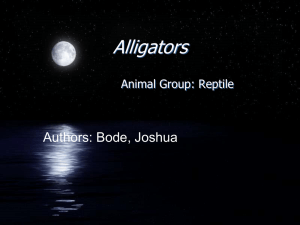

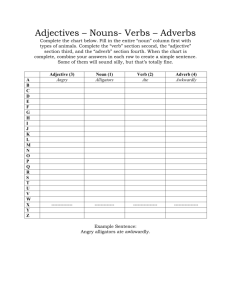
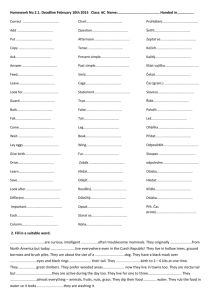
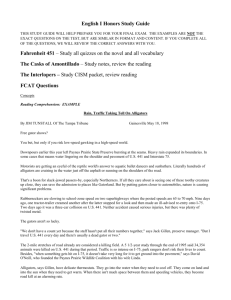

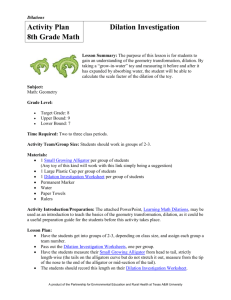
![Chapter Overview 4] Biodiversity and Evolution: Chapter Overview](http://s3.studylib.net/store/data/007156354_1-fad095015625514dd60c5e2467fa2168-300x300.png)
